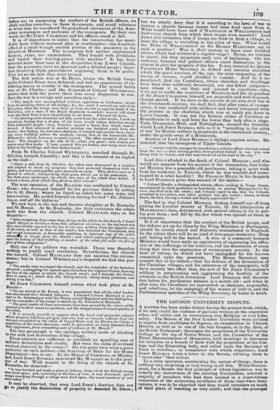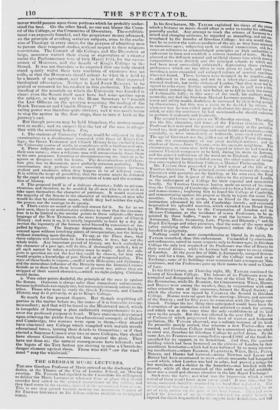THE LONDON UNIVERSITY DISPUTE.
A MATTER has been under debate during the present week, which, if we may credit the violence of partisan writers on the respective sides, will either end in overturning true Religion or true Libe- rality. The Senate of the New London University were inclined to require from candidates for degrees, an examination in Church History, as well as in one of the four Gospels, or in the Acts, of the Greek Testament : thereupon the proptietors of the University College at the top of Gower Street, and the Committee of the Three Denominations of Dissenters, held meetings to denounce the intention as a breach of faith with the proprietors of the Col- lege and the Dissenting body, aud called upon the Secretary of State to interfere ; in compliance with which requisition, Lord JOHN RUSSELL wrote a letter to the Senate, advising them to " reconsider "their notion.
To a calm spectator, scrutinizing the nature of things, there is nothing very surprising or very wrong in all this. When Govern- ment, for a Senate the first principle of whose legislation was to remedy the narrowness of the existing Universities, selected a majority of members who had been trained in a superstittoUS veneration of the surpassing excellence of those time-worn insti- tutions, it was to be expected that they would introduce as much of their plans of teaching as they could; and that the principal
mover would pounce upon those portions which he probably under- stood the best. On the other hand, no one can blame the Coun- cil of the College, or the Committee of Dissenters. The establish- ment was expressly founded, and the proprietors' money advanced, on the principle of avoiding sectarian subjects, even to the exclu-
sion of f hcology in every shape, for the purpose of admitting tnen
to pursue their temporal studievithout respect to their religious convictions. The Council of the College, and the Dissenters at large, moreover waived their claim or expectation or a charter
under the Parliamentary vote of 10th March 1833, for the conve- nience of Ministers, and the benefit of King's College in the
Strand. It was not therefore to be. expected that one body should stand quietly whilst their very condition of existence was set aside, or that the Dissenters should submit to what th .y held to
be a breach of agreement, and that in favour of their supposed
theological adversaries. Neither is Lord JouN RessELL to be praised or censured for his conduct in this particular. The under-
standing of the principle on which the University was founded is clear: even the Senate itself must have had some qualms upon the subject, or why apply to the Home Secretary to " consult the Law Officers on the question respecting the reading of the Greek Testament and Church History ?" The course of the over- ruling power was therefore quite obvious; and it was munch better to stop the matter in the first stage, than to turn it Lack at the journey's end. But though persons may be held blameless, the matter cannot rest in medio ; and we suspect that the law of the ease is altoge- ther with the resisting bodies. Fur, 1. The students of University College would be subjected in their
examinations to a disadvantage eompared with those of King's Col- lege; the Greek Testament and Church History being exeludcd from the University course of study, in compliance with a fund 'mental rule.
2. These subjects are questionable and difficult to lie managed in their own nature.; since a religious man will unconsciously shape them to his own purposes, favouring or discountenancing the student as he agrees or disagrees with his tenets. The determinations will there- fore give rise to discontent, most probably occasion partiality. The examinations may perhaps create unseemly contentions between student and examiner, when they happen to be of different sects. It is within the verge of possibility, that the master might be defeated by the pupil on such points as interpretation of texts and the construc- tion of history. a The proposal itself is of a dubious character ; liable to miscon- struction, and therefore to be avoided by all men who do not wish to take upon themselves the character of partisans. It would represent the majority of the Senate in the character of tricksters—of men who would do that by circuitous means, which they had neither the right, the power, nor the courage to do openly. 4. There exists no sound or sufficient reason foe it. So far as we have seen, there is no authoritative evidence to show that the examina- tion is to be limited to the secular points in these subjects—the mere language of the New Testament, the mere temporal parts of Church History : and were it so, it is utterly impossible to limit by a dry di- rection the ingenuity of the human mind biassed by conscience or im- pelled by bigotry. The language department, too, cannot freely be entered upon without involving points of interpretation, nor the history without trenching upon theology. To say, as the Times does, that these subjects will contribute to form a scholar, is true, but not the whole truth. Any important period of history, any book embodying the character of a past age, will do this, if thoroughly studied; bat as all such cannot be taken, a selection must be made. And the sub- jects in question are not the best that could be chosen, for him who would acquire a knowledge of pure Greek or of temporal policy. The style of these books is impure—stuffed with Hebraisms and Syriasms ; and the miraculous influence of the Divinity upon the historical events forbids us to draw from them lessons of present use, unless they are stripped of their sacred character,—which no right-judging Christian would desire.
5. Were other points doubtful, the principle of the case is against the Senate. Omission is always safer than compulsory enforcement, because individuals can supply one, but not conscientiously submit to the other. Those who want to study the Greek Testament, and Church History, may do it privately, or go to King's College.
So much for the present dispute. But though acquitting all parties in the matter before us, the cause of it is traceable to some misconduct ; and that will be found in the Ministerial mind, which is incapable of forming a plan sufficiently comprehensive to an- swer the professed purpose in hand. When statesmen determined upon relieving the public from the educational monopoly of Oxford and Cambridge, two courses were open to them,—they should have chartered any College which complied with certain merely educational terms, leaving their details to themselves : or if they elected a Supreme Council over two or more Colleges, they should have chosen Councillors without bias against the plan. They have not done so; the natural consequences have followed ; and the bigots of the Tory faction are striving to raise a Church-in-
danger clamour against them. Those who " sow the wind " must " reap the whirlwind."



























 Previous page
Previous page